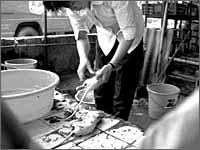With a large-scale anti-rat campaign launched in China’s Foshan City, Guangdong Province this year, poisoned vole meat has ended up being served as a delicacy in the city’s restaurants. In response, the city authorities have urgently issued a decree to ban all serving of vole meat in all restaurants in the city. They have stated that not only is the belief that vole meat has high nutritious value incorrect, but that eating meat from poisoned vole can be fatal.
Since last January, a large-scale centralized vole extermination campaign has been underway in over 300,000 acres of farming fields in the suburb of Foshan City. During the same time, advertisements for purchasing voles were seen everywhere. Capitalizing on the abundance of voles being caught, a number of villagers mixed dead voles that had been poisoned with live captured ones and sold them to local restaurants. The price of live voles was ten yuan per jin (500 g) while that of dead voles was five yuan per jin.






